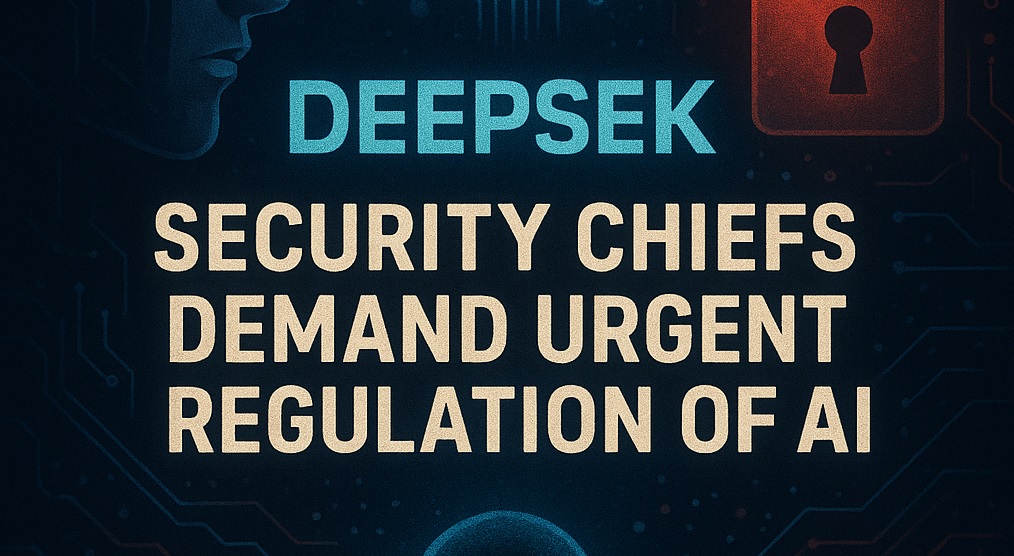UK CISOs Raise Alarm Over Chinese AI DeepSeek: Cybersecurity Risks, Regulation, and the Future of AI Governance
Table of Contents:
Growing concern among Chief Information Security Officers (CISOs) in the UK is reshaping the conversation around AI security risks, particularly with the rapid rise of Chinese AI chatbot DeepSeek.
While artificial intelligence has long been hailed as a breakthrough for business productivity and innovation, enterprise security leaders are warning that it could also accelerate cyber threats, data breaches, and AI-driven cyberattacks.
81% of UK CISOs Call for Urgent Regulation of DeepSeek
A new report from Absolute Security’s UK Resilience Risk Index reveals that four in five (81%) CISOs want immediate government regulation of DeepSeek and other generative AI platforms.
The concerns aren’t theoretical. CISOs believe that without strict oversight, AI chatbots like DeepSeek could become the catalyst for large-scale cyber incidents, ransomware attacks, and data leaks.
Key findings from the report include:
- 34% of CISOs have already implemented AI tool bans due to cybersecurity risks.
- 30% have disabled specific AI deployments inside their organisations.
- 42% now see AI as a bigger cybersecurity threat than a defensive tool.
AI Platforms Like DeepSeek Creating New Cybersecurity Threats
The biggest worry is how AI-powered platforms could be weaponised by hackers, exposing sensitive data or being used in social engineering attacks, phishing campaigns, and corporate espionage.
- 60% of CISOs predict a direct increase in AI-driven cyberattacks.
- The same percentage believe AI tools are already complicating their data privacy and governance frameworks.
- Nearly half (46%) of security leaders admit their teams are unprepared to defend against AI-enhanced cyber threats.
This shift highlights the AI security readiness gap – a vulnerability that many believe can only be closed through national-level regulation and AI governance frameworks.
Why Businesses Are Banning AI Tools – But Not Abandoning AI
The rise of AI security risks in enterprises has forced many companies to hit pause. However, experts stress this isn’t a permanent retreat.
Instead, businesses are adopting a strategic AI adoption strategy, balancing innovation with cyber resilience:
- 84% of UK organisations plan to hire AI specialists by 2025.
- 80% of companies are committing to AI training for C-suite executives.
- Investment is shifting toward AI governance frameworks, cyber risk assessments, and safe AI deployment strategies.
This dual approach—upskilling internal teams while bringing in external AI talent—is designed to ensure AI adoption remains a competitive advantage without becoming a security liability.
The Call for Government Oversight in AI Cybersecurity
Security leaders agree that corporate investment alone is not enough. They are demanding government intervention, including:
- Clear AI governance policies
- National AI cybersecurity standards
- Oversight of data handling practices in AI platforms like DeepSeek
- A pipeline of skilled AI security professionals
Without such measures, CISOs warn of widespread disruption across critical UK industries, from finance and retail to healthcare and infrastructure
Conclusion: Balancing AI Innovation with Security
The UK cybersecurity landscape is at a crossroads. On one side, AI promises efficiency, automation, and competitive growth. On the other, tools like DeepSeek highlight the risks of unregulated AI adoption.
CISOs are not advocating for a halt to AI progress. Instead, they want stronger partnerships with government regulators to establish rules of engagement, AI security compliance standards, and ethical safeguards.
The message is clear: AI must remain a force for progress, not a catalyst for crisis.
FAQs on DeepSeek, AI Security Risks, and UK CISOs
1. What is DeepSeek and why are CISOs concerned about it?
DeepSeek is a Chinese AI chatbot gaining popularity for its advanced capabilities. UK CISOs are concerned because its data handling practices and potential misuse could expose organisations to data breaches, cyber espionage, and AI-driven cyberattacks.
2. How can AI platforms like DeepSeek increase cybersecurity risks for businesses?
AI platforms like DeepSeek can be weaponised by hackers to launch sophisticated attacks such as phishing, ransomware, and social engineering scams, making it harder for businesses to defend sensitive data.
3. Why do UK security leaders believe AI chatbots need government regulation?
CISOs argue that without AI regulation and compliance frameworks, tools like DeepSeek could outpace cybersecurity defences, leading to national-level cyber threats and systemic risks across industries.
4. What types of cyberattacks can be powered by AI tools like DeepSeek?
DeepSeek and similar tools can support automated hacking, password cracking, deepfake phishing, insider threat detection evasion, and corporate espionage, making cyberattacks faster and more effective.
5. Is AI considered more of a threat than a solution for enterprise cybersecurity?
Yes. According to the survey, 42% of UK CISOs now see AI as a bigger threat than a defensive tool, due to its potential misuse in cybercrime and data privacy violations.
6. How many UK CISOs have banned AI tools due to cybersecurity concerns?
The study shows that 34% of CISOs have banned AI tools entirely, while 30% have shut down specific AI deployments to protect sensitive company data.
7. Why are some CISOs calling for an outright ban on certain AI deployments?
CISOs are banning AI tools that lack transparent data handling policies, pose risks of data leakage, or fail to comply with enterprise cybersecurity frameworks.
8. What is the “AI security readiness gap” mentioned by cybersecurity experts?
The AI security readiness gap refers to the mismatch between AI-driven attack sophistication and the ability of security teams to defend against them, leaving organisations vulnerable.
9. How are CISOs preparing their organisations for AI-driven cyber threats?
CISOs are focusing on hiring AI specialists, training leadership teams, building AI governance frameworks, and implementing advanced threat detection systems to strengthen resilience.
10. What percentage of UK security leaders feel unprepared for AI-enhanced attacks?
Nearly 46% of CISOs admit their teams are not adequately prepared to handle the unique cybersecurity risks of AI-driven attacks.
11. Why is government regulation of AI tools like DeepSeek considered urgent?
Regulation is needed to set boundaries for AI use, prevent misuse in cybercrime, and create national cybersecurity standards that protect businesses from AI exploitation.
12. What kind of AI governance policies are UK businesses asking for?
Businesses want clear guidelines on AI deployment, ethical AI frameworks, data privacy safeguards, and mandatory compliance standards to reduce security risks.
13. Could a lack of AI regulation trigger a national cyber crisis?
Yes. Without oversight, AI platforms could be exploited for large-scale ransomware attacks, financial fraud, or infrastructure sabotage, leading to a national cyber crisis.
14. How should governments oversee AI data handling practices to ensure security?
Governments should enforce AI transparency laws, require data localisation and encryption, and mandate independent audits of AI platforms to ensure responsible use.
15. What role will AI compliance standards play in future cybersecurity frameworks?
AI compliance standards will ensure that organisations deploy AI responsibly, align with data protection laws (GDPR, UK Data Protection Act), and minimise risks of AI misuse.
16. Are businesses abandoning AI due to cybersecurity risks?
No. Businesses are not abandoning AI but are taking a strategic pause to strengthen cybersecurity before expanding AI adoption.
17. How are companies balancing AI adoption with cyber resilience?
Companies are combining AI innovation with strict security measures by adopting safe AI tools, enforcing governance policies, and training employees in AI risk awareness.
18. Why are UK organisations prioritising the hiring of AI specialists in 2025?
84% of UK organisations plan to hire AI specialists to manage AI adoption, build security frameworks, and mitigate AI-driven cyber threats.
19. What AI training initiatives are companies implementing for C-suite executives?
80% of businesses are investing in AI training for executives, ensuring leadership teams understand AI risks, compliance, and strategic opportunities.
20. How can businesses adopt AI tools safely without increasing cyber risk?
Businesses can adopt AI safely by implementing:
-
AI governance frameworks
-
Regular cybersecurity audits
-
Data privacy compliance
-
Third-party AI risk assessments
-
Employee AI security training




